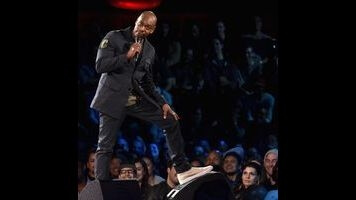Dave Chappelle is back for real. That’s the very welcome message delivered this morning by a pair of comedy specials, part of a three-special deal the comic inked with Netflix. Deep In The Heart Of Texas (recorded in Austin in 2015) and The Age Of Spin (filmed in L.A. in last year), come on the heels of Chappelle’s much-heralded Saturday Night Live hosting gig this past November, and are just as triumphant. Signaled by his now-infamous departure from Chappelle’s Show in 2005 and the decade outside the spotlight that followed, Dave Chappelle is unquestionably in charge. In charge of his career, his message, and, as is evident in these two sets, his instrument.
In both specials, Chappelle is as relaxed and confident as he’s ever been, casually smoking and crouching on a stool while resting his feet on the stage speakers, his loose demeanor in service of a comic voice that is, uniquely and uncompromisingly, his own. In the earlier special (which Netflix places second in the running order), Chappelle is raspier, as if coming off a cold—or, more likely considering his mid-set request to bum a cigarette from the audience, some serious chain smoking. Not that Chappelle had to work himself into shape necessarily, but the L.A. set sees the comic brighter and tighter, with the Austin show’s relaxed, anecdotal vibe amped up into something sharper. It’s also more structured, with tales about the four times he’s met O.J. Simpson providing a sturdy frame for his rumination on race, celebrity, and the bloody convergence of both as depicted in American Crime Story: The People V. O.J. Simpson.
Since both shows were taped before the 2016 presidential election, neither deals at all with Donald Trump and his race-baiting, misogynistic rhetoric per se, but both outings see the comic delving into the politics of sex, race, and gender in ways that dig deeper and carve broader than mere character assassination or political critique. Chappelle digs to the very human bedrock and holds up what he’s discovered—whether you want to look at it or not. And sometimes, people do not. Both specials outline various times where Chappelle has been under attack, and both provide ammunition for yet more. Incidents like the time a racist audience member threw a banana peel onstage at a show in Santa Fe or an abortive 2015 Detroit set provide Chappelle with a chance to not so much tell his side of the stories as hilariously and provocatively broaden the context.
Chappelle is, above all, himself. It’s what sets him apart as much as his stellar material or his effortlessly confident delivery. No one sounds like Dave Chappelle. No matter how many comics cite him as an influence or how many he cites in return, Dave Chappelle emerges through his material with an authority that is unforced, and all the more commanding for it. Which isn’t to say his material all goes down easy. Lesser comics reach for controversy as a gimmick (or just because they’re contrary assholes), but Chappelle never appears to be straining when he broaches tough topics. Nor does he go out of his way to disarm the room once he’s done so—his signature move, a slumping shrug and giggle, generally comes when he’s let a joke veer into a filthy and/or silly punchline rather than as defense against the bristles he’s raised. Chappelle deliberately raises bristles and then leaves his viewers to negotiate their way home.
The comic also reveals he’s been under attack for his material about gay and transgender themes. There’s more of that tricky territory to navigate in both specials, whether Chappelle is telling a story about “gay bloggers” accusing him of homophobia (Chappelle assures that he has no problem with gay people—it’s bloggers who are his nemeses), being upbraided for using the wrong pronoun when offering to help a transgender person OD-ing at a gallery opening, or running afoul of a formerly feared high-school bully who’s come out of the closet. Chappelle never lets go of the idea that black people in America have a different perspective on other oppressed groups, even while he’s unquestionably on their side. The middle-aged Chappelle might come off like something of the grumpy old man when he singles out a 20-something audience member for his generation’s perceived propensity for taking hair-trigger offense, but his urge to step back and look at the big picture emerges more like wisdom. (“You have to pace yourself. Brown V. Board of Education was 50 years ago, and somebody called me a ‘nigger’ in traffic last Tuesday.”)
Describing his childhood obsession with Bruce Jenner as an athletic ideal (“He was beating Africans at track and field!”), he wonders at the hopeful feeling he had when Jenner came out to mostly supportive press as Caitlyn, asking, “Is this a time in American history where an American can make a decision for themselves?” At the same time, he confesses, “Although David Chappelle, the black American, he was a little jealous—transgender people beating black Americans in the discrimination Olympics.” Chappelle confidently identifies himself as a common-sense feminist, but relates telling off a white woman demanding that her suffering is equal to his by responding, “You was in on the heist, you just don’t like your cut.”
Chappelle uses taboo terms like “tranny,” “fag,” and “dyke,” all while crafting thoughtful but uncompromising bits about his perception of how drawing absolute lines based on such distinctions are harmful and, more importantly, impediments to real human connection—and progress. “Here we go, here comes the deep water,” grins Chappelle in The Age Of Spin, before launching into an involved dissection of the outcry over boxer Manny Pacquiao’s homophobic statements. The thing is, it is deep water, and Chappelle explores it as well as any other comic ever has, all the while dropping essential, inescapable jokes that explode in his wake. You can chase Chappelle down—that his persona is so authoritative doesn’t preclude thinking he’s full of shit—but you’re going to laugh, a lot, while you do it.








































